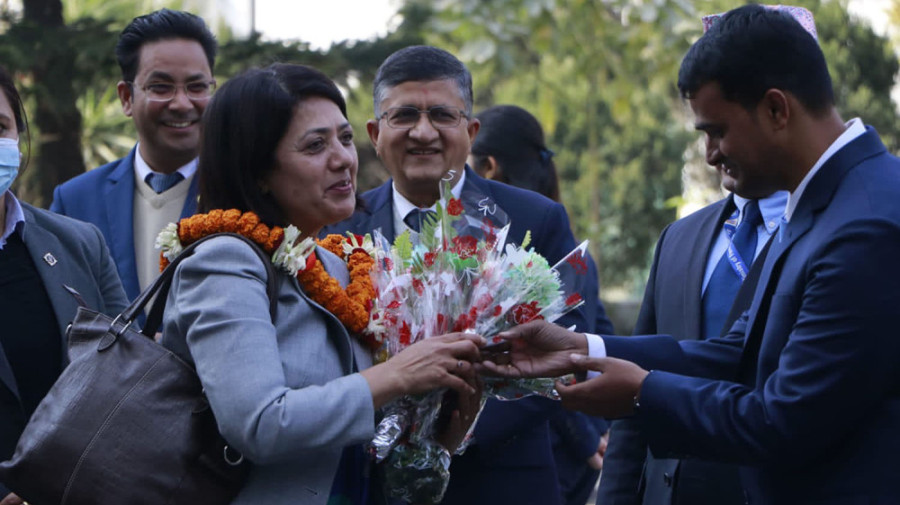National
New foreign minister stresses non-alignment
Experts say Bimala Rai Paudyal has challenges both on domestic and foreign fronts.
Post Report
Nepal got its third female foreign minister in Bimala Rai Paudyal on Tuesday. Before her, Nepali Congress leader Sujata Koirala, and Sahana Pradhan of the CPN-UML led the Ministry of Foreign Affairs after the restoration of democracy in 1990.
Paudyal, a member of the national assembly, served earlier as a member of the National Planning Commission. She has a PhD in Development Studies from the Institute of Social Studies, the Hague, the Netherlands; an MA in Economics and Management of Rural Development and Post Graduate Diploma in Development Administration from Manchester University, UK; and a BSc in Agriculture Economics from Tribhuvan University, Nepal.
Talking to reporters after assuming office Tuesday, she said that she would work to stabilise the country’s foreign policy.
“Foreign policy should not change with the change in ministers and we should stick to our long-held policy of non-alignment,” she said.
“There might be some differences among parties on how to interpret non-alignment, but it remains at the core of our foreign policy and we will accordingly make a common position,” said the new foreign minister.
On boundary disputes and issues with neighboring India and China, she said a lot of study is needed before commenting on the issue. “I cannot say I will do this or that without a detailed study. Whatever our decision, it will be based on national interest and no compromise will be made on national interest,” she said.
She also promised to improve service delivery at her ministry and the Department of Passports.
Service seekers have long complained that they do not get passports on time and have to deal with multiple hassles.
Besides easing the passport distribution system, Minister Paudyal has several other policy-related challenges as foreign minister, say experts and observers.
Since the composition of the government is diverse—political parties of all ideological leanings are in it—finding a middle-of-the-road solution to issues is another challenge, said officials.
She has to achieve a delicate balance while conducting foreign policy between India, China, the US and others, a government official said.
The prime minister has said he is visiting India soon so she is the one who should make the necessary arrangements.
“We have several outstanding issues to discuss with India including the currently suspended Gorkha recruitment under the Agnipath scheme, and issues related to boundary, energy, and connectivity, among others,” the official said.
“There are also issues with China. The SAARC process remains stalled. There is the Chinese-led Global Security Initiative. There are several challenges for both the prime minister and the foreign minister to tackle.”
CD Bhatta, a political and geo-strategic analyst said the new foreign minister should take steps to stop Kathmandu-based foreign ambassadors from meddling in Nepal’s internal affairs in breach of diplomatic norms.
“Foreign diplomats have been holding unofficial meetings with our politicians and giving different kinds of messages. Such activities should stop,” he said.
“Nepal’s other major challenge is how to win the confidence of the international community?”
But some experts are hopeful that the new foreign minister will help improve the country’s image.
“I hope that the new foreign minister is receptive to the suggestions from think tanks and academia and is able to represent not just her party but the entire coalition partners while dealing with the diplomatic community,” said Nischal Nath Pandey, director of the Center for South Asian Studies, adding, “The character of the current coalition is such that the foreign minister is compelled to embody the extreme left and the extreme right,” added Pandey.




 10.12°C Kathmandu
10.12°C Kathmandu













